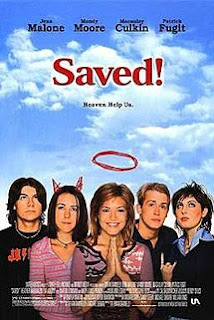Obviously, that's a big no-no, but after a vision of Jesus in a swimming pool, Mary decides to take drastic action. She has sex with Dean. Unfortunately, Dean's parents find his stash of gay porn and send him away to a halfway house to be "cured," and Mary learns she's pregnant. Confused, alone, she grows alienated from her familiar life at school, drawing the ire of her best friend Hillary Faye (Mandy Moore), who does not take kindly to anyone straying from the faith.
Friday, January 31, 2025
Saved!
Obviously, that's a big no-no, but after a vision of Jesus in a swimming pool, Mary decides to take drastic action. She has sex with Dean. Unfortunately, Dean's parents find his stash of gay porn and send him away to a halfway house to be "cured," and Mary learns she's pregnant. Confused, alone, she grows alienated from her familiar life at school, drawing the ire of her best friend Hillary Faye (Mandy Moore), who does not take kindly to anyone straying from the faith.
Tuesday, January 28, 2025
Army of Shadows
Army of Shadows (1969) is directed by Jean-Pierre Melville, himself a member of the French resistance during World War II. I don't know how much of his own experience is reflected in the film, but it is not a glamorized portrayal. Set in late 1942 in Nazi-occupied France, the movie shows us no explosions, midnight raids, firefights, or even a real sense of eventual triumph.
Monday, January 27, 2025
Mean Creek
Mean Creek could be described as a cross between Stand by Me and Deliverance. One day, Sam (Rory Culkin) gets beat up by middle school bully George (Josh Peck). Sam turns to his older brother Rocky (Trevor Morgan) to help get back at George, and they enlist Rocky's friends Clyde (Ryan Kelley) and Marty (Scott Mechlowicz) in a scheme to lure George on a rafting trip in the woods where they can humiliate him. Along for ride but initially not privy to the group's ulterior plan is Millie (Carly Schroeder), Sam's girlfriend. The plan eventually sets in motion, but then, things go horribly, horribly wrong.
Saturday, January 25, 2025
Reservoir Dogs
Reservoir Dogs might be the closest Quentin Tarantino ever got to making a serious, gritty, straight-up thriller.
True, his debut has its share of his trademark, pop culture-soaked dialogue and quirky, eccentric characters, but at 90 minutes, Reservoir Dogs is lean and mean. The characters have fewer redeeming qualities, indulging in cruelty and violence for their own sake. Innocent people are hurt and killed, and the violence is less surreal and comic and more brutal; it looks like it really hurts, with nothing about it being remotely funny.
When John Travolta accidentally shoots Phil LaMarr in the back of the car and groans, "Ah man, I just shot Marvin in the face," it's hysterical because he's such a doofus and his choice of words tries to downplay the severity of what he did.
When Michael Madsen slices off a cop's ear with a straight razor while dancing to Steeler's Wheel's "Stuck in the Middle with You," it's terrifying in its coldness and cruelty. Even though we don't see the act, it is uncomfortable to imagine, and famed horror director Wes Craven reportedly walked out of a screening of the movie in disgust.
Travolta in Pulp Fiction plays a screwup; Madsen in Reservoir Dogs plays a sociopath.
Friday, January 24, 2025
Inglourious Basterds
Inglourious Basterds features a lot of talking and enough pop culture references to feel like a Tarantino movie, but there's something else at work. Instead of going just for laughs, the dialogue goes for tension and suspense. Each sentence is another turn of the screw.
Inglourious Basterds is a funny movie. Like Pulp Fiction, it is a surreal, pop comic world of quirkiness, absurdity, and violence - but it's also incredibly tense and uneasy and not just in the moments of unexpected gore.
Hitchcock postulated the bomb-under-a-table-theory: a bomb that explodes unexpectedly is a surprise, but a bomb, under a table, that the audience is waiting to see go off, is suspense. Tarantino understands this theory, and it's at play throughout Inglourious Basterds. The violence in Pulp Fiction was often a surprise, but here, the drawn-out dialogue keeps us uneasy because we know a bomb, literal or metaphorical, is about to go off; we just don't know when or how.
Friday, January 17, 2025
Pulp Fiction
Reservoir Dogs announced Quentin Tarantino's arrival, but Pulp Fiction cemented his place as a quirky, idiosyncratic filmmaker whose presence was going to be felt in Hollywood for a while.
Pulp Fiction contains many recognizable elements and tropes from the crime and film noir genres - professional hitmen, crime bosses, murder gone wrong, etc. - but the presentation and layout are wholly original. The movie has its moments of shocking violence and sequences of almost unbearable tension, but the overall effect is comedic. Despite the ghastliness and the morally bankrupt characters who commit atrocities, the viewer can't help but laugh (as long as they aren't too squeamish).
-
George Romero was incredibly prolific in the 1970s and '80s, but in the '90s, he hit a rut. Despite being attached to many high-prof...
-
Among other things it's capable of, art can do two things: it can be a statement by the artist about the world, and it can be a revealin...
-
Reservoir Dogs announced Quentin Tarantino's arrival, but Pulp Fiction cemented his place as a quirky, idiosyncratic filmmaker whose p...








